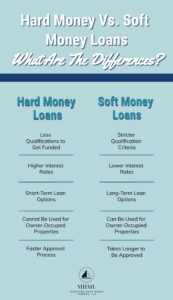Hard Money vs. Soft Money Loans: What are the Differences?
There are many ways to invest in real estate and several different financing options for most property types. When looking at a new investment property, it’s important to evaluate your loan options carefully. Generally, the loan you choose depends on the property, your goals, and the qualification criteria for the loan. Most people immediately think of a traditional mortgage loan for a real estate investment. However, there are alternative financing options, like a hard money loan. Today, we’ll discuss the differences between hard money vs. soft money loans and why you might choose one over the other.

Contents of This Article:
- What Are Hard Money Loans?
- What Are Soft Money Loans?
- Differences Between Hard Money vs. Soft Money
- Pros and Cons of Hard Money vs. Soft Money
- Why Choose a Hard Money Lender?
What Are Hard Money Loans?
Typically, getting a loan requires good credit, a sizeable down payment, and excellent repayment history.

However, hard money loans are unconventional loans that focus more on the value of the financed asset rather than creditworthiness. Hard money loans are short-term loans provided by private companies or lenders. Residential hard money lending is specifically for short-term projects, like rehabs, fixer-uppers, or bridge financing.
What Are Soft Money Loans?
Soft money loans are more traditional, long-term loans offered by banks or financial institutions. Like most conventional loans, soft money loans look at the borrower’s credit history, income, and other factors to determine a rate. Soft money loans have a longer repayment term and can be used for several investments, whether an owner-occupied home, rental property, or extensive real estate renovations.
Differences Between Hard Money vs. Soft Money
Some of the main differences between hard money vs. soft money loans are the criteria for obtaining the loan, the interest rates, and the terms. Additionally, the purpose of the loan can differ, as some people need short-term financing while others want a long-term loan.
Qualification Criteria
When it comes to qualifying for a hard money loan, it mostly depends on the value of the property you’re looking to finance. However, that doesn’t mean that your creditworthiness doesn’t matter. Most lenders evaluate your credit history but don’t necessarily use it to determine a loan amount.

On the other hand, soft money loans are subject to strict underwriting guidelines. For instance, they’ll look at your creditworthiness and history, verify your income, debt-to-income ratio, and more. These factors help the lender determine a fair interest rate and loan amount.
Interest Rates
Due to the increased risk for lenders, hard money loans come with significantly higher interest rates. For instance, interest rates for hard money loans can range anywhere from 8% to 15%, depending on the lender.
However, soft money loans generally offer lower interest rates since they’re provided by established financial institutions and are less risky. As such, interest rates may range from 5% to 8% for a conventional, soft money loan.
Loan Terms
Hard money loans typically have short repayment terms–usually six months to two years. Many investors look for hard money loans for short-term projects, like a fix-and-flip investment. On the other hand, soft money or traditional loans may range from 15 to 30 years.
Purpose
Both hard and soft money loans can be used to purchase real estate. However, hard money loans are suitable for short-term investments, like fix-and-flip projects or bridge financing. Additionally, hard money loans generally cannot be used for owner-occupied properties.
On the other hand, soft money loans can be used for various investments, including owner-occupied homes. Additionally, you can use them for more investments than just real estate. For instance, you may look into a soft money loan for other significant expenses like home renovations or education costs.
Pros and Cons of Hard Money vs. Soft Money
With any loan type or investment strategy, there are pros and cons. Before choosing a suitable loan for your investment, it’s essential to understand the benefits and disadvantages. So, read along to learn more about the pros and cons of hard money vs. soft money.
Pros of Hard Money
- Great for Short-Term Needs- Depending on your use of the loan, a shorter repayment term could be a pro or a con. For instance, a short-term loan is beneficial if you’re completing a fix-and-flip project. However, having a solid plan and timeline for completing projects within the repayment term is crucial.
- Fewer Requirements- Hard money loans have fewer requirements and less strict criteria, making it easier to get approved. Instead of evaluating creditworthiness, hard money lenders look at the investment value to determine a loan amount.

- Faster Lending Process- Hard money loans are generally approved within a few days, much faster than a traditional mortgage loan. Once you finish the paperwork and get approved, you can access your property and start your project quickly
Cons of Hard Money
- Higher Interest Rates and Fees- Hard money loans are convenient for borrowers but risky for lenders. So, due to the higher risk and faster approval, hard money loans typically have higher interest rates and larger down payments.
- Risk of Losing Your Investment- Since the investment property is used as collateral for the loan, you risk losing your investment if you default on the loan. If you cannot pay, your lender can seize the investment property.
Pros of Soft Money
- Lower Rates and Fees- Depending on the borrower’s creditworthiness and other factors, soft money loans may have lower interest rates compared to hard money loans.
- More Favorable Terms- Soft money loans are great if you need a longer-term loan for your investment. As with most conventional loans, soft money loans have longer repayment terms, giving you more time to pay it off.
- No Collateral Requirement- Since there’s no collateral requirement, borrowers don’t risk losing their assets if they default on the loan. Instead, you’ll risk your creditworthiness.
Cons of Soft Money
- Stricter Qualification Criteria- Banks and other financial institutions have stricter loan qualification criteria. For instance, they’ll look at your credit score, income, repayment history, and more before funding a loan. Unfortunately, obtaining a soft money loan with a poor credit score can be difficult.
- Takes Longer to Close On- Approval for soft money loans takes much longer than hard money loans, usually around 14 to 20 days. So, a hard money loan may be more suitable if you’re looking for fast funding.
- More Paperwork Required- Soft money loans require a ton of paperwork, which can be time-consuming and frustrating for some. After all, it’s crucial to fill it all out properly, which can have you running around with the lending institution.
Why Choose a Hard Money Lender?
If you want to finance a real estate purchase, look at the differences between hard money vs. soft money to determine which is best for you. After all, the type of loan that will be best for you depends on your goals and what type of property you’re purchasing.

Hard money loans are an excellent option for investors that don’t qualify for traditional financing or those looking for fast financing. Maryland Hard Money Lenders works with all types of investors, whether you’re looking for a fix-and-flip loan, a buy-and-hold loan, or bridge financing.
If you’re looking for a trustworthy local lender, look no further than Maryland Hard Money Lenders. As long as you provide the right documentation, we can fund your loan within 48 hours. So, contact us to learn more or complete a loan application today!



